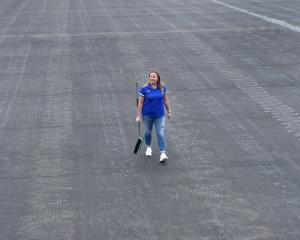
"The real enjoyment is the conservation side and the thought we could be helping to save another species.
"It's great getting things to grow and the reward is seeing seedlings popping through," Mrs Fay said.
Mrs Fay has been volunteer planting co-ordinator at the ecosanctuary for the past three years, and works up to 40 hours a week.
Volunteers planted about 2000 native seedlings last season, and about 1600 more this year.
General manager Chris Baillie said Mrs Fay's efforts were recognised at celebratory events for ecosanctuary volunteers in Dunedin on Tuesday night.
"She provides horticultural expertise for our planting plan, collects local-provenance seed, does the propagation and potting at Blueskin Nurseries and at her own place, prepares orders of materials and seedlings, recruits sponsors of weed mats and plant guards, delivers plants to the sanctuary, organises, supervises volunteers and even provides their refreshments.
"She is a great inspiration to staff and volunteers working way beyond the call of duty," Ms Baillie said.
Volunteers contributed about 800 hours of labour each month, she said.
Valued at market rates (of about $20 an hour) their contribution would equate to almost $200,000 a year.
"We just could not pay market rates. This is a community-driven initiative and we could not do it on a commercial basis."
There were 150 volunteers registered with the sanctuary but up to 300 people worked there annually.
Volunteers ranged from the "retired and energetic", to children in Scout groups.
During University of Otago orientation week activities, 90 students who were residents of St Margarets College spent a day planting and weeding at the ecosanctuary.
The Rotary Club of Dunedin was sponsoring a track upgrade, providing labour and materials for the 2km Valley Track which passes the Orokonui Stream.
Ms Baillie said the pro bono work of lawyers and trust members should also be acknowledged.












